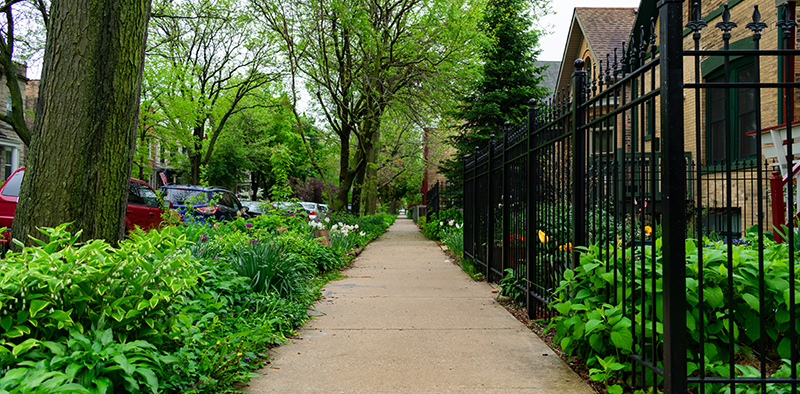Sidewalk Requirements
Sidewalk Ordinance Background and Engagement

Prior to the Americans with Disabilities Act of 1990, the City of Houston did not require the construction of sidewalks for residential properties. As a result, you can find pockets in the city where neighborhoods are inaccessible for persons with disabilities. There are many neighborhoods, especially those constructed between the 1960s and 1970s that do not have sidewalks.
After 1990, the City established sidewalk requirements, and Houston Public Works has been the authority that ensures compliance. However, the requirements were not codified, and exemptions were regularly granted for a variety of reasons. In 2019, the City Engineer established a sidewalk policy through memorandum that stipulated the circumstances an exemption could be granted. This memorandum formed the basis for sidewalk review until the Walkable Places Transit-Oriented Development ordinance was approved by City Council in the summer of 2020.
Regulations after October 2020
Prior to Oct. 1, 2020, the Office of City Engineer reviewed all sidewalk related applications. At that time, the City had sidewalk requirements established based on different street classifications. However, the sidewalk requirements were not written in the ordinance, which created challenges for code enforcement.
During the Walkable Places and Transit-Oriented Development Ordinance development, the departments of Planning, Houston Public Works and the Mayor’s Offices for People with Disabilities and Economic Development collaborated on drafting new standards. As of Oct. 1, 2020, the Planning and Development Department began reviewing sidewalk widths and locations along all public streets within the city limits of Houston, while the Office of City Engineer reviews the sidewalk engineering specifications.
This process allows the Planning and Development Department (PD) to review sidewalk widths and locations simultaneously with landscaping requirements along the public streets. It allows planning staff to enforce the ordinance compliance before it reaches the late stages of the permitting process and avoid unnecessary delays. The process also gives applicants the flexibility to file an application for the modification of sidewalks or safety buffer standards in certain circumstances. PD will review all sidewalk applications in collaboration with the Office of City Engineers (OCE) and the Mayor’s Office for People With Disabilities (MOPD).
The revised requirements state that all applicable new developments must provide a sidewalk in front of the subject property. The regulations stipulate a number of circumstances for which exemptions may be granted. This requirement applies to applicable development along all public streets in the City limit. The sidewalk width will be determined by the adjacent public street classification.
The ordinance establishes eight circumstances to exempt sidewalk requirements along streets that are not desirable or are impractical for new sidewalk construction. The ordinance also gives property owners who apply for the Sidewalk Standard Modification Applications flexibility to address unique scenarios that prevent them from complying with the ordinance requirements. This administrative review process is conducted by the Sidewalk Review Committee, which is composed of representatives from Planning and Development Department, Office of City Engineer, and Mayor’s Office for People with Disabilities.
Ordinance Amendments as of January 2023
City Council voted on January 25, 2023 to adopt Sidewalk Ordinance amendments that give property owners and developers another option to comply with the City’s existing sidewalk ordinance requirements, while still advancing the City’s goals to create a safe, comfortable, and accessible sidewalk network for all Houstonians.
The amendments establish the option for property owners and developers to opt out of constructing the required sidewalk and instead pay a Fee in Lieu of Sidewalk Construction for qualifying properties that meet certain criteria such as homes in neighborhoods without existing sidewalks. These fees will be collected for a Sidewalk Fund, which will be used to construct sidewalks that extend the sidewalk network to key destinations.
The ordinance amendments went into effect March 1, 2023, and will apply to new building permit applicants and applicants previously approved for a sidewalk construction deferral.
Seventeen Sidewalk Service Areas were established to collect the Fee in Lieu of Sidewalk Construction and to allocate sidewalk projects within each area. The funds will be divided in a 70/30 split between building sidewalks in the area the fee was collected in, and a city-wide network based on need. This allocation will help to promote complete sidewalk network equitably throughout the city. The Sidewalk Fund will be managed by the Planning and Development Department and implemented by Houston Public Works.
The amendments aim to overcome challenges with the implementation of the Sidewalk Ordinance 2020-684, that went into effect on October 1, 2020, and help achieve the goals of Plan Houston, Resilient Houston, Houston Climate Action Plan, Complete Streets, and Vision Zero.
Sidewalk Amendment Public Engagement:
- Proposed Sidewalk in Lieu Fee Presentation (December 2, 2022)
- August 23, 2022 City Council Committee Presentation
- May 26, 2022 Planning Commission Presentation
- CH 40 Art XXII. Sidewalk Network Ordinance – Planning Commission Draft
- Sidewalk Network Ordinance Public Comment Summary
- Proposed Sidewalk Ordinance Amendments FAQ (updated on November 30, 2022)
